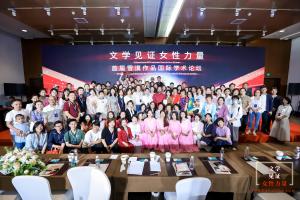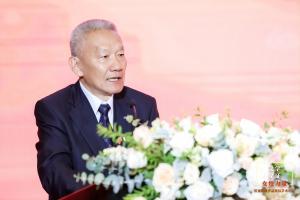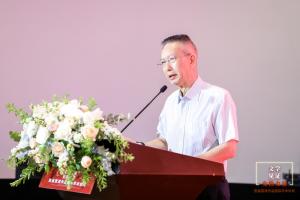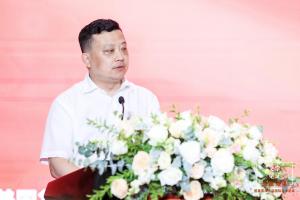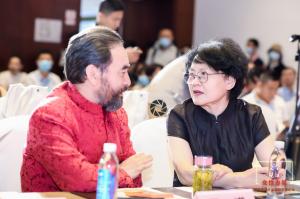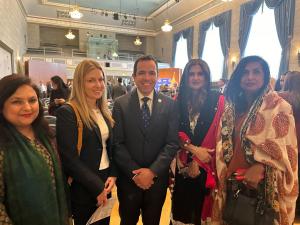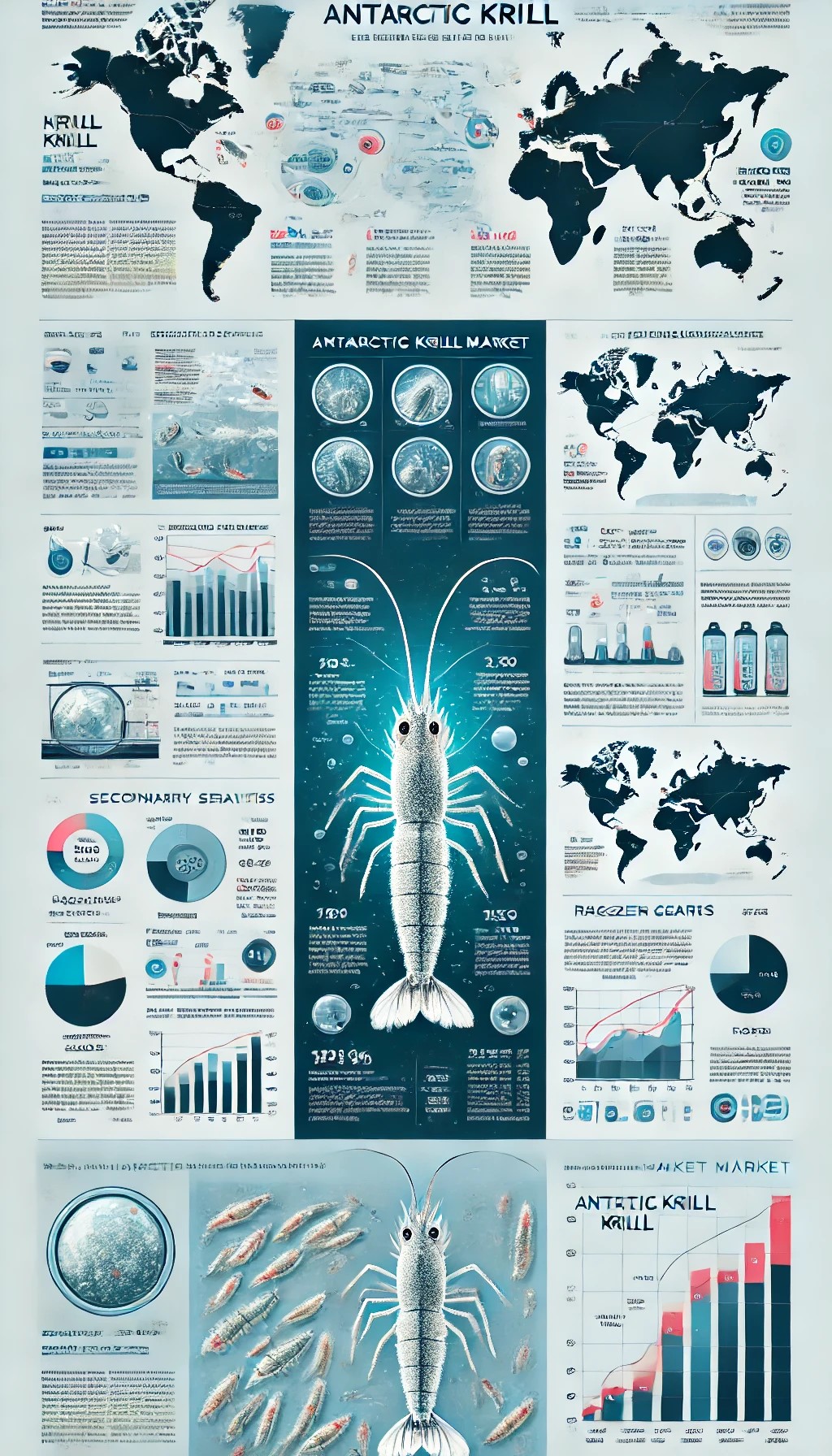What exactly marks the inception of heroism and the beginning of humanity’s overall decline?
— Xue Mo
MELBOURNE LN, AURORA, ILLINOIS, US, June 22, 2023/EINPresswire.com/ — Through wars, brutality, and authorities, a prevailing set of social values slowly took shape and etched its place in the annals of human history. This marked the inception of heroism and the beginning of humanity’s overall decline.”
The first International Academic Forum of Xue Mo’s Literary Works commenced on June 15th in Beijing amid great fanfare. With the objective of elevating the influence of Chinese civilization and promoting cross-cultural exchanges, the forum centers around the theme “Literature Witnesses Feminine Power.” It explores various topics, such as female power, female self-enlightenment, Eastern love and wisdom, and the charm of Chinese literature. By unearthing the epochal significance and value of Xue Mo’s works, the event aims to foster international recognition and dissemination of Chinese-language literary works.
Distinguished guests included Wu Shulin, Chairman of the Publishers Association of China; Yu Tao, Vice Director of the China Foreign Languages Publishing Administration; Huang Yulong, Dean of the Academy of Translation, the China Foreign Languages Publishing Administration ; Antoine Lecornu, President of the Sino-French Cultural Exchange Association; Kim Sung-I, President of the Kyungji Publisher; and He Ying, Deputy Executive Director of the Xue Mo Center for Chinese Literature Translation. Additionally, Chris Luo, President of the U.S.-based Sinomedia International Group, delivered a speech via online video. Chen Yanjin, editor of China People’s Publishing House, Chaired the Forum.
This forum was co-organized by Sinomedia International Group, Xue Mo Center for Chinese Literature Translation, and Beijing Ruxue Media. An unveiling ceremony of Xue Mo Center for Chinese Literature Translation also took place during the event.
During the presentation session, sinologists, translators, critics, and scholars interpreted the classic female characters in Xue Mo’s novels from multiple perspectives. Professor Chen Xiaoming from Peking University delivered a keynote speech titled “Women on the Land: Xue Mo’s Portrayal of Western China. By analyzing the female characters in novels such as Desert Rites, Desert Hunters, White Tiger Pass, Curse of Xixia, and Wild Fox Ridge, he led the audience to slightly appreciate the unique literary style of Xue Mo and his profound understanding of human nature.”
Other notable presentations included “Interlingual Translation of Cultural Imagery in Chinese Agrestic Novels” by Wang Bihui, Vice Dean of the School of Foreign Languages at Nanjing Xiaozhuang University; “Female Narratives and Cross-Linguistic Reconstruction in Xue Mo’s novel Into the Desert” by Xin Hongjuan, a professor from the School of Foreign Languages at Ningbo University; “Female’s Outlook on Survival in Xue Mo’s Novels within the Cultural Traditions of Rural China” by Lin Lin, a lecturer from the College of Science and Technology, Ningbo University. Besides, Professor Liu Chen from Beijing Foreign Studies University, Israeli writer Tali Carmi, and Professor Zhang Li from Beijing Normal University also delivered their respective talks.
Xue Mo, a renowned writer and cultural scholar, delivered a thought-provoking speech at the end of the forum, delving into deep-seated causes of human conflicts and wars. He argued only with the rise of feminine power, all people accepting and embracing their feminine (yin) qualities like love, acceptance, generosity, compassion and inclusiveness, could humanity achieve lasting peace and end perpetual conflict.
Xue Mo began his speech with the intriguing Chinese anecdote of “False Beacon to Fool Feudal Lords,” highlighting the inception of heroism and the beginning of humanity’s overall decline.
“Once upon a time there was an icy, yet beautiful Queen named Bao Si, who barely smiled at her husband, King You. To amuse her, the foolish King played tricks on his feudal lords three times by raising a false alarm about enemy attacks. The feudal lords fell for it and all looked embarrassed, which eventually made the Queen smile.”
“In the midst of thunderous battle cries, Queen Bao Si smiled. It was then that King You realized the astonishing power of violence and bloodshed over women. Please don’t underestimate this tale, for it marked the beginning of male dominance. Through wars, brutality, and authorities, a prevailing set of social values slowly took shape and etched its place in the annals of human history. This marked the inception of heroism and the beginning of humanity’s overall decline.”
Once men began to write history, the world became filled with gunpowder, and women were marginalized as “the other”. Delving into a sea of historical texts, Xue Mo discovered that a great majority of successful individuals, often referred to as heroes, had strong connections to brutal acts. The practice of linking violence with success and heroism directly overturned the fundamental understanding and value system of humanity. This echoes with a classic passage from Simone de Beauvoir’s masterpiece, “The Second Sex”:
“Representation of the world, like the world itself, is the work of men; they describe it from their own point of view, which they confuse with absolute truth.”
Here, many people may be reminded of a book revered by many filmmakers and writers as the “bible of storytelling”—Joseph Campbell’s “The Hero with a Thousand Faces.” This book elaborates on a universal hero narrative structure, also known as the “monomyth.” Campbell believes that the “Hero’s Journey” is a common narrative pattern that can be found extensively in myths, legends, and stories across various cultures worldwide. This perspective reveals that the notion of heroism in today’s society is often a single-way stereotype, influenced by the bias and prejudices formed by the patriarchal mindset.
“Were there any wars in matriarchal societies? While there is no evidence to suggest that wars occurred in matriarchal societies, it does not mean conflicts never existed during that period. It is worth noting that these conflicts did not escalate into bloody massacres.” Xue Mo attributed this to the prevalent Feminine (yin) power and maternal authority in matriarchal societies.
These reflections and inquiries have strengthened Xue Mo’s determination to create an uplifting epic for the Han Chinese and beyond. Its protagonist is totally different from the any heroes throughout human history. She represents the 1001st possibility and is a true hero – a female hero from a much higher dimension, who possesses an incredibly broad perspective and extraordinary insight. After witnessing numerous tragedies resulting from human violence, she decides to intervene in the human world, awakening love and wisdom, compassion and kindness deep within people.
“So, my Suosalang: The Ultimate Book, was born. With a length of nearly 100,000 lines totaling over 2 million Chinese characters, Suosalang recounts the journey of a young goddess trying to save her dying mother and dying planet.”
“Destruction was gradually approaching as the planet succumbed to overindulgence and rampant development. Five champions were then tasked to save their homeland chose to be reincarnated on a distant planet known as Earth. In human forms, they eventually lost themselves and forgot their mission. In order to save her mother as well as her home planet, a brave and intelligent young goddess followed the five champions to Earth. Incarnated in a human form, she set out to awaken the five champions from their earthly amnesia. During this process, she attained self-completion and became the brilliant light that led others to enlightenment.”
“The journey of the goddess and five champions was filled with challenges and hardships. They went through tests of romantic entanglements, life and death, fame and fortune, demons, and other evil forces, but eventually, they found the eternity that they were determined to find.”
“Suosalang touches on such enduring themes as the choices between good and evil, love and faith, excellence and mediocrity, war and peace, ego and universal love, and many more. Through the journey of the characters, the reader can see the wisdom that may guide them through tough choices like these in their own life. Suosalang is certainly a masterpiece that nobody wants to miss.”
Laozi,a sage of China, often uses feminine and maternal imagery to describe the Dao in his Dao De Jing. In his view, the Dao is a primordial force that gives birth to and nurtures all things in the universe. It is a source of life and wisdom, and its qualities are often depicted as gentle, nurturing, and receptive, much like a mother
Ida
Ruxue International Media Inc
email us here
Visit us on social media:
Facebook
Twitter
Instagram
YouTube
TikTok
![]()
Originally published at https://www.einpresswire.com/article/641025735/xue-mo-interprets-feminine-yin-power-the-1001st-possibility-of-a-hero

